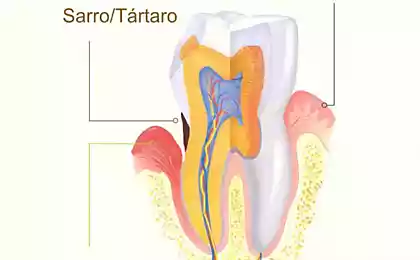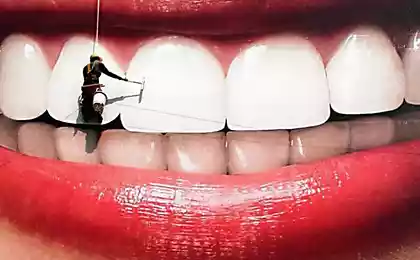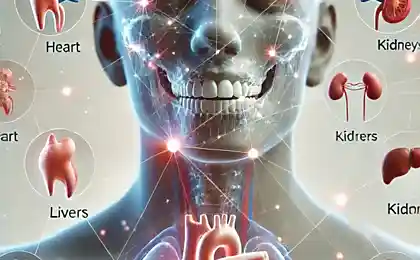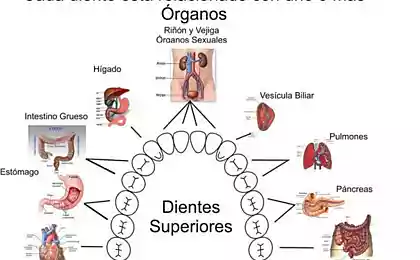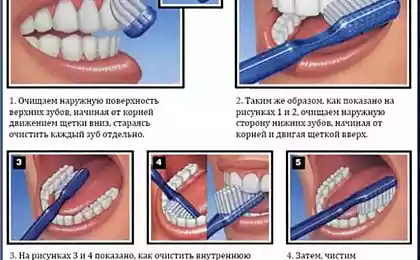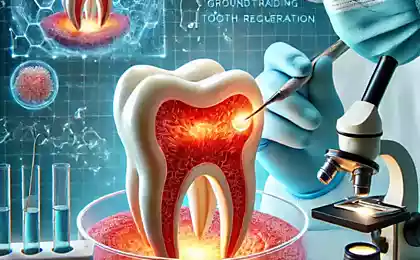271
Which is better, a pin or an implant? All the pitfalls of dental implants! There are hellish minuses...
Napoleon Bonaparte said, “If you have courage, you can get involved in any business, but this alone is not enough for success.” This statement quite accurately reflects the features of the process of dental implantation. To “get involved” in the installation of implants, you need to thoroughly understand the details.

DepositPhotos
Despite all the assurances of dentists in the safety and convenience of implants, patients often listen to a variety of “horror stories” about implantation, which are persistently circulating among the population. Is it better to put implants or not to take risks? What to choose for tooth replacement – pin or implants? Let's try to figure it out.
Implantation of teeth is a relatively new technique that allows implantation into the gums of artificial roots in the form of implants. After that, a crown or an artificial tooth is placed on the base, which does not differ from the present.
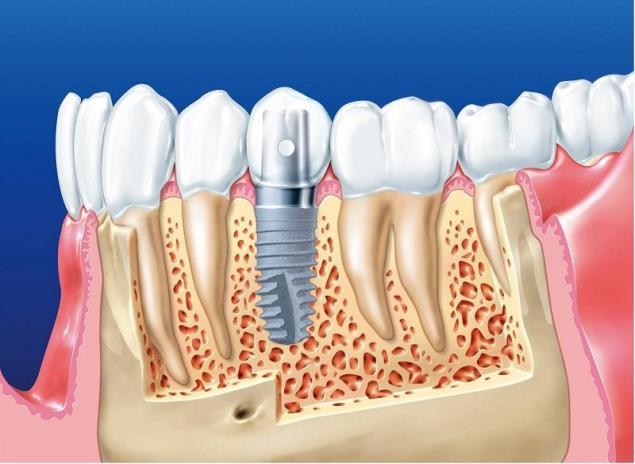
There are two types of implantation by method and time of execution: one-stage and two-stage. Single-stage dental implantation It takes only 1-2 weeks and requires 2 to 4 dental visits.
The decision to carry out one-stage implantation is made after tooth extraction, for this purpose the hole is examined. A positive result is guaranteed if the removal operation is carried out carefully and non-traumatically, and the tissue around is not destroyed by inflammation.
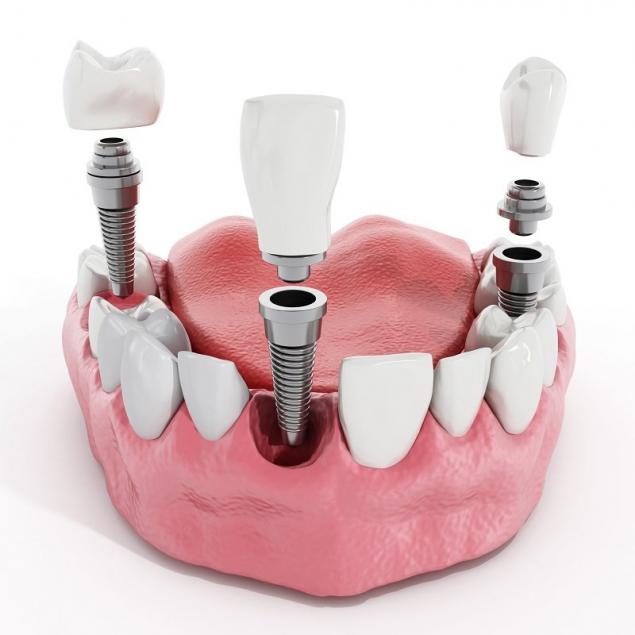
DepositPhotos Two-step dental implantation It involves the installation of all elements of the implant design in stages.
Stages of implantation
With single-stage implantation, less surgical manipulation is performed, a high cosmetic effect is achieved and no gum plastic is required in the future (as with two-stage implantation). But with this technique, the risk of complications is higher, since it does not involve suturing the hole and isolating the implant.
Whatever type of implant you choose, you need to understand that osseointegration (engraftment) of the implant takes the same time: 6 months for the upper jaw and 3 months for the lower jaw.
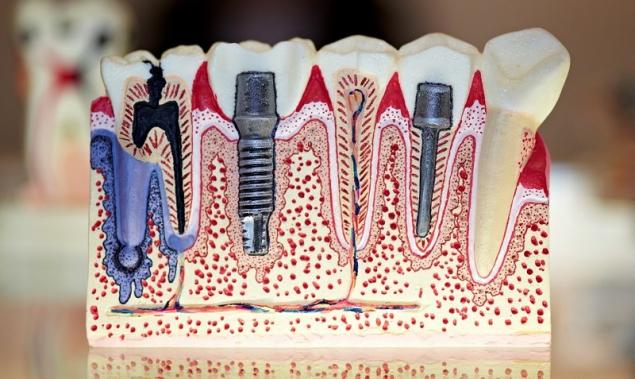
Until the engraftment process is completed, the implant cannot be given a full chewing load, so permanent prosthetics in both cases is possible only after 3 or 6 months. Before that, with a one-step method, an abutment is worn on the implant, connecting the part with the crown, and a temporary crown.
Despite the fact that with a single-stage implantation, the patient can immediately get an aesthetic effect, two-stage dental implantation is used much more often, since it has an aesthetic effect. a much smaller number of contraindications and a greater percentage of engraftment.
The most popular questions about dental implants
Knowing the truth about implants, you can decide if necessary to install them. Do not look at the fact that it is expensive. There is nothing more expensive than health.
In order not to bring it to the implantation of dentures, properly take care of your teeth. Adhering to the rules of hygiene and observing the culture of carbohydrate consumption, you will never know what caries is!
Learn also about natural mouthwashes that will make your teeth healthy and strong. Oak bark, chamomile, linden color - all these ingredients are sold in pharmacies at ridiculous prices, but can help with problems with teeth. Take care of your teeth and be healthy!

DepositPhotos
Despite all the assurances of dentists in the safety and convenience of implants, patients often listen to a variety of “horror stories” about implantation, which are persistently circulating among the population. Is it better to put implants or not to take risks? What to choose for tooth replacement – pin or implants? Let's try to figure it out.
Implantation of teeth is a relatively new technique that allows implantation into the gums of artificial roots in the form of implants. After that, a crown or an artificial tooth is placed on the base, which does not differ from the present.

There are two types of implantation by method and time of execution: one-stage and two-stage. Single-stage dental implantation It takes only 1-2 weeks and requires 2 to 4 dental visits.
The decision to carry out one-stage implantation is made after tooth extraction, for this purpose the hole is examined. A positive result is guaranteed if the removal operation is carried out carefully and non-traumatically, and the tissue around is not destroyed by inflammation.

DepositPhotos Two-step dental implantation It involves the installation of all elements of the implant design in stages.
Stages of implantation
- Planning, panoramic images and analysis
The preparatory stage is one of the most important during dental implantation. The patient should increase attention to oral hygiene, since sterility is the key to a successful operation. In addition, at the stage of preparation for treatment, a study of the jaw system is carried out. Computed three-dimensional tomography of the jaw is performed to identify possible pathologies or contraindications to dental implantation. If necessary, sanitation of the oral cavity is carried out - removal of plaque and stone, treatment or removal of teeth.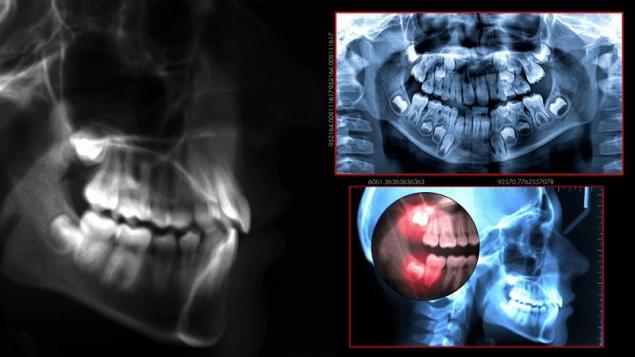
DepositPhotos - Surgical intervention
At this stage, the bone bed is dissected for implant installation. To do this, an incision is made in the gum, its stratification is made, a place for a new artificial root is formed. Then an implant is installed in the resulting bed, which is protected by a screw plug. This allows you to protect it from the growth of tissues and the ingress of food. After the implant is installed, the gums are sewn up.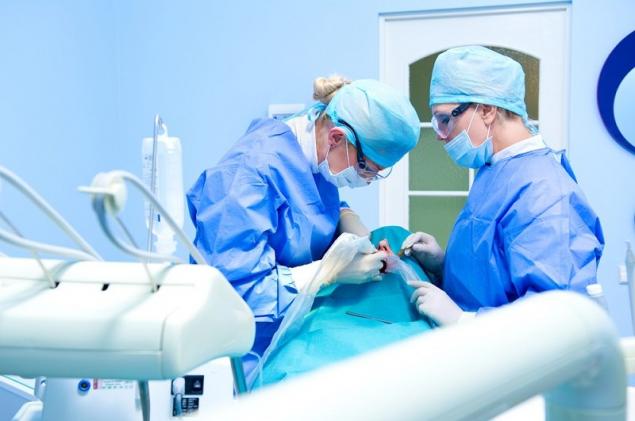
DepositPhotos - Implant engraftment process
It takes 1.5 to 6 months to fully engraft. If the operation is carried out on the lower jaw, it is enough 2-3 months, on the upper - up to 6. For the period of implantation, a cosmetic tooth is temporarily placed. - Installation of the "gum shaper"
After implantation of the teeth and engraftment of the implant, the gums are again cut and the “gum shaper” is installed. It is necessary to create a base for an artificial tooth. The duration of its formation is 1-2 weeks. After removal of the former, when the implant is fully taken root, an abutment is put. It is the link between the implant and the prosthesis. In a week you can start prosthetics. - The final stage: prosthetics
The orthopedic dentist makes casts, makes and installs the crown on the implant. The main purpose of this stage is the installation of a denture. According to the principle of fixing an artificial tooth, removable, combined, conditionally removable and non-removable prostheses are distinguished. They are made by an orthopedic doctor on casts. The crown is placed on the implant.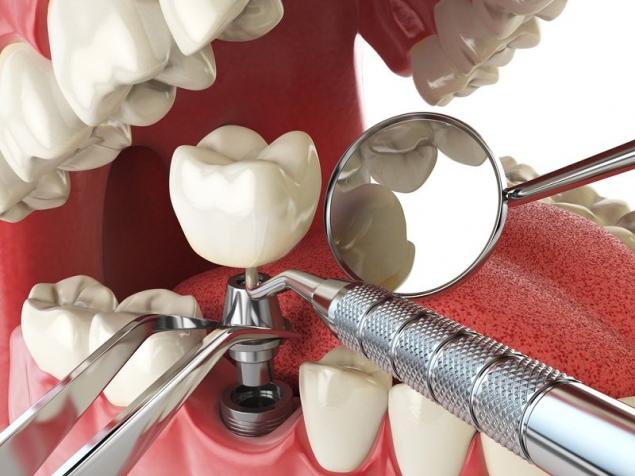
DepositPhotos
With single-stage implantation, less surgical manipulation is performed, a high cosmetic effect is achieved and no gum plastic is required in the future (as with two-stage implantation). But with this technique, the risk of complications is higher, since it does not involve suturing the hole and isolating the implant.
Whatever type of implant you choose, you need to understand that osseointegration (engraftment) of the implant takes the same time: 6 months for the upper jaw and 3 months for the lower jaw.

Until the engraftment process is completed, the implant cannot be given a full chewing load, so permanent prosthetics in both cases is possible only after 3 or 6 months. Before that, with a one-step method, an abutment is worn on the implant, connecting the part with the crown, and a temporary crown.
Despite the fact that with a single-stage implantation, the patient can immediately get an aesthetic effect, two-stage dental implantation is used much more often, since it has an aesthetic effect. a much smaller number of contraindications and a greater percentage of engraftment.
The most popular questions about dental implants
- What to choose for tooth replacement - pin or dental implants?
To determine the solution, you need to know the difference between these orthopedic designs. The first and most important thing that a pin differs from an implant is the purpose and scope of application. The pin is a thin fiberglass, titanium or steel rod that is installed in the dental canals to strengthen the crown of the destroyed tooth. Pins allow you to preserve the native root of the tooth and restore the crown part with the help of filling materials or artificial dental crowns.
As for implants, these are titanium or zirconium artificial roots that are implanted in the bone tissue of the jaw or periosteum and serve as a support for future prosthetics (the same crown installation). In other words, the pin is an auxiliary restoration design, the implant is already a denture design.
You will not install a dental pin if there is a strong destruction of the walls and root of the tooth or the thickness of the wall is not enough to install the pin. In addition, the pin in the tooth is not inserted in patients with caries, periodontal diseases, the presence of cysts or granulomas.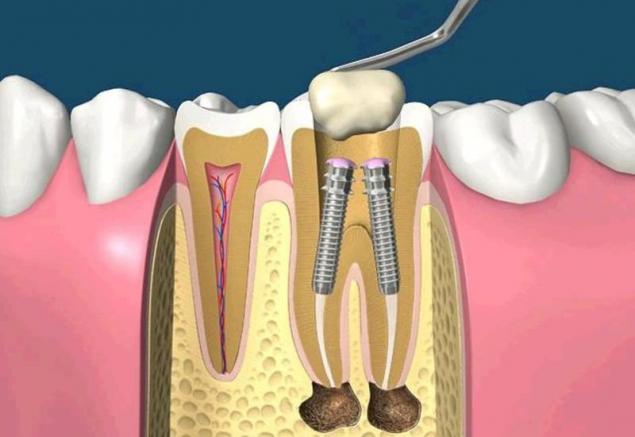
- Is it possible to put an implant if it is possible to install a crown?
In fact, there is no clear answer to this question. Of course, the installation of the crown (prosthetics) is a more reliable and high-quality procedure. However, for the crown you will need, first of all, to grind the enamel from neighboring teeth, and this can hardly be called a positive point. As for the installation of implants - for them, stretching is usually not required. - Are there many contraindications for dental implantation?
Dental implantation, like any surgery, has certain contraindications. Absolute restrictions include malignant formations, diabetes, tuberculosis, disorders of the immune system (HIV, AIDS) and blood clotting, acute diseases of the nervous system, blood vessels or joints. In addition, implantation is not recommended or allowed after prior treatment for heavy smokers, with poor oral hygiene. In general, there are few contraindications and surgery is contraindicated only in acute and serious stages of diseases.
- The doctor said I have bone atrophy, what is it?
Atrophy of bone tissue is a decrease in its volume, which occurs immediately after tooth extraction. Nature suggests that normal blood supply inside the bone is achieved due to the load, which is transmitted through the root of the natural tooth when chewing food. As soon as the tooth is removed, the metabolic processes in the bone stop and it shrinks, decreases in size. Often this prevents the implantation of teeth, since it is not possible to fix the implant in a small bone.
- Do I need to quit smoking for surgery?
Smoking is not an absolute contraindication for dental implantation, however, in order to reduce the risk of possible rejection of implants (after all, nicotine significantly reduces the protective functions of the body), it is recommended to abandon completely or at least reduce the number of cigarettes consumed to a minimum two weeks before surgery and at the same time after implantation. - Is the implantation done under anesthesia?
No, dental implantation is carried out under anesthesia - only the implant area is frozen. If it is necessary to implant a large number of structures in the jaw, the use of anesthesia can be considered, but often this is not justified. In addition, you may be offered sedation - you will be conscious, but at the same time in a relaxed state due to the introduction of sedatives that reduce the nervous tension of the body.
DepositPhotos - Will I have to walk without my teeth?
The issue of aesthetics after implantation is solved by fixing removable prostheses. Yes, it is not too convenient, but at the time of implant engraftment, that is, their complete fusion with bone tissue, the load on the structure must be reduced. Therefore, immediately after implantation into the bone of implants, casts are removed for the manufacture of temporary removable prostheses - "butterflies". They are quite aesthetic, in addition, allow you to fully chew food.
They will be fixed exclusively on the gums (in the case of a large number of missing teeth) due to the effect of "suction", or cling to the base of natural teeth in the mouth.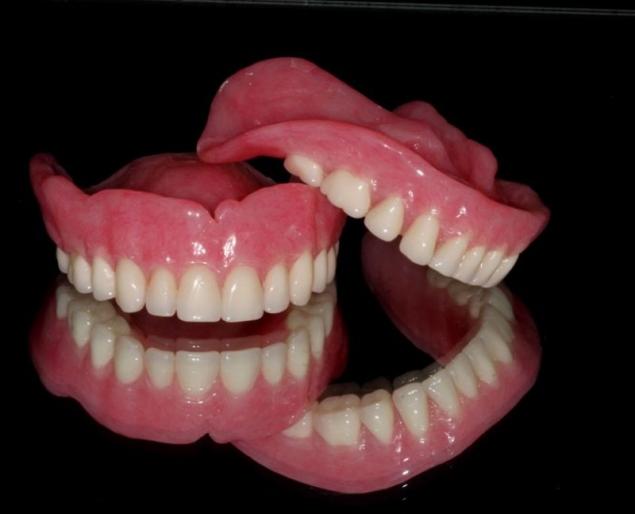
- What is implant rejection and how to determine that the implant has not taken root?
Dental implant rejection occurs in the case of its unprofessional installation, lack of proper oral hygiene, incorrectly selected design. Characteristic symptoms: the appearance of acute pain in the area of the installed implant, the appearance of pus or bleeding, redness and swelling of the gums, mobility of the implant along with the crown, possibly also an increase in body temperature.
The implant can also be rejected after several years of active use. Among the main causes are various injuries, a violation of the body's immune system.
- What prostheses can be put on implants?
On implants, you can fix absolutely any dentures - removable, dental bridges or single dental crowns. In the case of their attachment to implants, the service life of structures increases 2-3 times. As for removable prostheses, they do not need to be removed every day - this should be done only periodically for thorough oral hygiene. - What is the life of implants and prostheses?
The service life of dental implants is at least 10 years, but in the absence of pathologies from the body, with proper installation, they can even outlive the patient himself, so, as a rule, implants serve an average of 20 years or more. As for prostheses that are fixed on implants, their service life is 10-15 years, and the most high-quality ones are more than 20 (we are talking about crowns made of zirconium dioxide). When replacing dentures, implants are not injured, so their re-installation is not required. - What is the guarantee for dental implants?
There are several types of warranty: for the implants themselves (given by the manufacturer and starts from 10 years or more), for prostheses (given by the clinic, as a rule, one year), as well as for the installation of implants (also given by the attending physician and also for one year). In case there are problems with the implants, it is necessary to conduct a study - through whose fault this happened.
DepositPhotos
Knowing the truth about implants, you can decide if necessary to install them. Do not look at the fact that it is expensive. There is nothing more expensive than health.
In order not to bring it to the implantation of dentures, properly take care of your teeth. Adhering to the rules of hygiene and observing the culture of carbohydrate consumption, you will never know what caries is!
Learn also about natural mouthwashes that will make your teeth healthy and strong. Oak bark, chamomile, linden color - all these ingredients are sold in pharmacies at ridiculous prices, but can help with problems with teeth. Take care of your teeth and be healthy!
Meat chop recipe for minced dinner
Nicotinic acid: dissolves stagnant fats, as a result, the skin is saturated... Truly magic!











